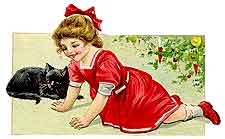
As we prepare for the holidays, we should keep in mind securing the safety of some very special family members - our cats. Their environments change dramatically with new sights and scents as we decorate and prepare for Christmas festivities. We should be aware that some of these tempting delights and decorations can pose health risks for our curious cats.
Many of our holidays decorations are live plants that cats may be tempted to explore with their mouths. Cats should be kept away from dangerous plants such as poinsettias, holly, and mistletoe. Mistletoe, if eaten can cause decreased heartbeat and a drop in blood pressure. Ivy is another common decoration that can pose health dangers . If eaten, it can cause diarrhea, convulsions, and if in large quantities, even death.
One of the biggest cat holiday temptations is the Christmas tree with its fresh smell and bright, colorful decorations. Dropped needles from the tree can become lodged in a cat’s esophagus if ingested making it painful when swallowing. Tinsel from the tree may cause stomach problems or choking. Obviously any broken glass ornaments should be carefully removed so that there are no remnants to become stuck in paws. Ribbon from packages makes tempting cat toys, but be sure not to leave kitty unsupervised as again, there is a choking danger. One final Christmas tree concern is the water in the Christmas tree stand. Cover the tree base tightly with your tree skirting to keep your pet from drinking the water which can cause diarrhea, vomiting, loss of appetite or mouth sores.
Provide your cat with appropriate cat treats rather than samples of our “people” goodies if you feel you need to include him in the celebration. Many of our rich foods will cause an upset stomach.
Winter temperatures are also a concern for those who have cats that spend time outdoors. Pets can suffer stress, hypothermia and frostbite if their body temperature drops just a few degrees below normal. The extremities, such as the tips of the ears, the tail, and the feet, are often the first areas affected by the cold. Ice balls may form on the feet leading to frostbite. If you suspect your pet is suffering from cold related injuries contact your veteranarian immediately.
One of the biggest pet dangers that comes with cold weather is antifreeze. If even a very small amount of antifreeze is ingested by your cat rapid and permanent kidney damage results. Be sure there are no open containers of antifreeze accessible to your cat or any puddles of it in your garage, yard, or on your driveway. If a cat walks through an antifreeze puddle there could be enough on his paws that may be ingested while cleaning them to cause severe damage. Please protect your cat from this serious potential danger.
Following these guidlines will help insure that your cat will have a safe time during the holidays. With all of the hustle and bustle that comes with holiday activities remember to save a little time to spend with your cat. Give him the gift of your attention. He will think that is the best present of all.